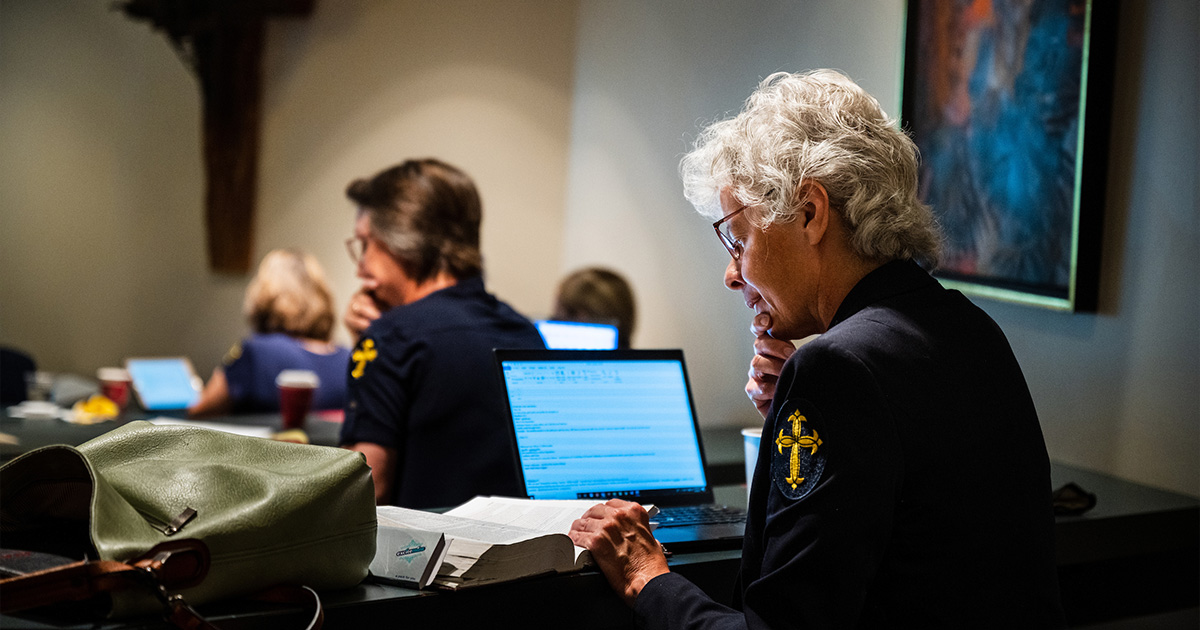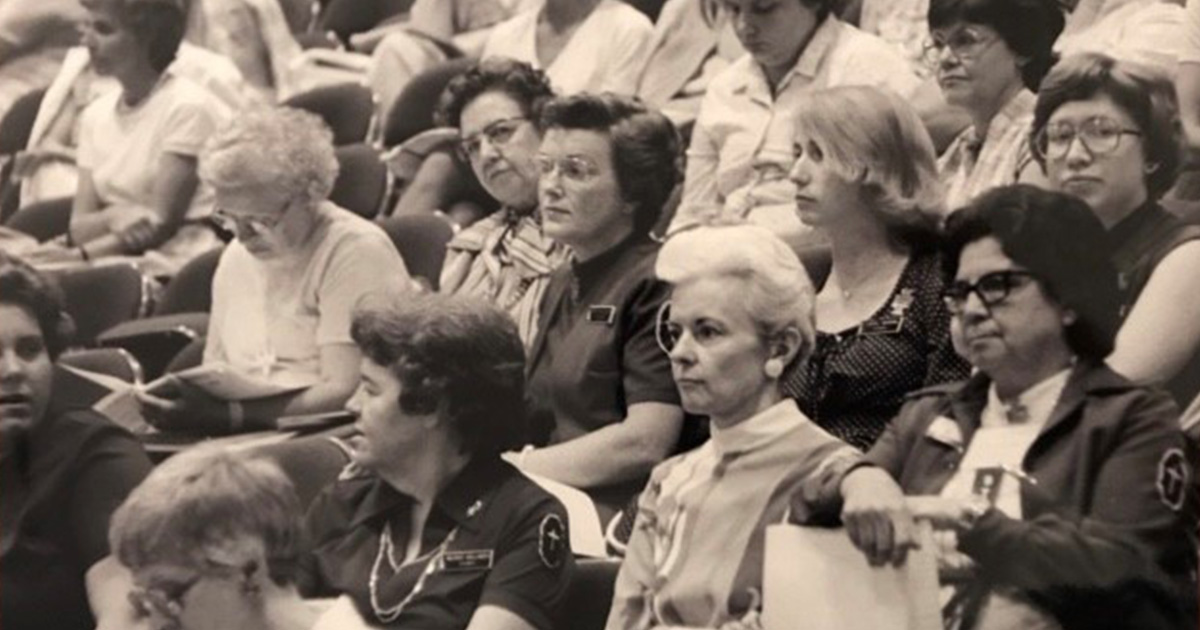
By Stacey Egger
The LCMS has three official deaconess training programs — one at Concordia University Chicago (CUC), River Forest, Ill., and one at each of the Synod’s two seminaries. Currently, 248 commissioned LCMS deaconesses serve congregations, Recognized Service Organizations (RSO), schools and other organizations across the Synod.
However, this has not always been the case.
Deaconesses have served in the Synod since the 1920s, but for decades no formal training program existed within the LCMS. Instead, deaconesses received training in programs associated with other organizations, and belonged to a pan-Lutheran deaconess conference that had no direct affiliation with the LCMS.
Grounded in Scripture
In the 1970s, Deaconess Nancy Nemoyer enrolled in the deaconess training program at Valparaiso University, Valparaiso, Ind. She knew she wanted to study theology and to serve the church, and the role of a deaconess seemed to be the perfect fit.
However, as she went about her deaconess studies, she quickly became concerned with theological currents that contradicted Scripture and her Lutheran convictions. When she spoke to professors about her concerns, they suggested that she consider another program, such as becoming a teacher or a DCE. But that was not where Nemoyer felt her gifts and talents lay. She felt isolated and discouraged.
“I had no idea that anyone else cared,” she said. “It was a complicated time.”
However, she soon met fellow student Cheryl Naumann, with whom she carpooled to her field work on Saturdays. During her placement in Fort Wayne, Ind., she met even more likeminded women.
Soon, a group of LCMS deaconesses were gathering regularly around the dining room table of Deaconess Betty Mulholland in Munster, Ind. Along with Mulholland, Naumann and Nemoyer, this group of women included Clara Strehlow, Joyce Ostermann, Kay Pritzlaff, Millie Brillinger, Ruth Stallmann and Luella Mickey.
Their conversation centered around their common goal — an LCMS-operated deaconess training program.
“We knew that we wanted to stay true to our understanding of the Bible as the true and inerrant Word of God, and we wanted to have further education and fellowship with women that felt the same way that we did,” said Naumann.
They succeeded. At the 1979 LCMS convention, a resolution was adopted stating that the LCMS should establish a deaconess training program at Concordia College (now CUC), River Forest, Ill.
The first class of LCMS deaconess students began their training at Concordia College in the fall of 1980. Nemoyer, then age 25, was appointed director of the program.

Working in faith, laboring in love
While LCMS women could now receive deaconess training within a Synod-operated program, there was still a missing piece: These LCMS deaconesses no longer had a conference to belong to for fellowship and professional growth.
The Lutheran ladies behind the new deaconess program did not miss a beat: In January 1980, they founded Concordia Deaconess Conference (CDC).
A motto was chosen: “Working in faith, laboring in love, remaining steadfast in the hope of our Lord Jesus Christ” (1 Thess. 1:3). A uniform was selected: navy blue, with a gold cross insignia that Naumann’s husband sketched up with input from CDC founders.
CDC members are invited to attend an annual conference, with theological and practical presentations, Bible studies and devotions, and opportunities for fellowship with deaconesses from around the country and the world.
They are also encouraged to form smaller gatherings with other CDC members in their regions, and to come together for fellowship and study on a more frequent basis.
Giving thanks
LCMS deaconesses have the opportunity to join CDC after completing their deaconess studies. Most do, and the conference has grown steadily since its formation, in step with the growth of the LCMS deaconess programs — programs were added at Concordia Seminary, St. Louis (CSL), in 2002, and Concordia Theological Seminary, Fort Wayne (CTSFW), in 2003. CDC became an RSO in 2009.
This year, there are 222 deaconesses in CDC.
CDC was not able to observe its 40th anniversary last year due to the pandemic, and chose instead to commemorate the anniversary at this year’s conference. While a single, in-person conference was not possible again this year due to ongoing restrictions, CDC celebrated its 41st annual conference using a “hybrid” model — sessions were held on a virtual platform, while nine “satellite campuses” hosted groups of deaconesses who watched and discussed the sessions together.
“People need that in-person experience. For many women, that is how they are fed and renewed. … We worked to figure out how to meet those needs in a way that was safe,” said Deaconess Dorothy Glenn, CDC’s member-at-large for conference logistics.
The satellite campuses — at CUC; CTSFW; Santiago De Los Caballeros, Dominican Republic; Memorial Lutheran Church, Houston; Faith Community Lutheran Church, Las Vegas; University Lutheran Chapel, Minneapolis; the LCMS Florida-Georgia District office, Orlando; Trinity Lutheran Church, Scarsdale, N.Y.; and Salem Lutheran Church, Affton, Mo. — gathered together groups of deaconesses ranging in number from three to 30.
According to Glenn, over 160 deaconesses participated in the virtual conference, making it the best-attended conference CDC has ever held.
The virtual platform also enabled CDC deaconesses to attend remotely from wherever they were, including Germany, Australia and Guatemala.
“Deaconesses are scattered all across the country and, more and more, around the world. This conference is an opportunity to belong to a community of your sisters,” said Deaconess Sarah Longmire, who is serving her second year as president of CDC.
Deaconess Kim Bueltmann, an LCMS missionary to Germany who works primarily with Persian refugees, has attended almost every CDC conference in the 19 years since she was commissioned.
This year, due to the virtual option, Bueltmann was able to tune in to the conference from Germany. She lives a three-hour train ride away from the nearest LCMS missionary.
“It’s always a joy and a blessing to be able to connect with the other deaconesses, and especially now that I’m so far away and pretty isolated here … it was really good to have that kind of support, and remember that there are sisters all over the world that are serving in various ways,” said Bueltmann. “It is also a great opportunity to hone our skills and learn more theology and find ways to put the things that we learn into practice.”
In addition to the theological presentations and practical sessions, the conference included fellowship and devotional time — through the virtual platform, and within the groups at each satellite location.
‘Gifts for just that time’
Several of CDC’s founders — Clara Strehlow, Millie Brillinger, Ruth Stallmann and Luella Mickey — have died, but the work of all of these women lives on.
“They were all phenomenal women, fitted together by God’s design to get this thing off the ground,” said Nemoyer. “And not a one of them would think that they were ‘phenomenal,’ but from Betty Mulholland to Joyce Ostermann to the already-sainted Clara Strehlow and Ruth Stallmann, they were amazing women, with gifts for just that time,” said Nemoyer.
Nemoyer says that she is joyful, but not surprised, to see how the deaconess program has grown and flourished over the past 41 years.
“We all see this in our lives, don’t we? It’s like God was working all along, but we don’t quite get it until we look back.”
Posted Aug. 13, 2021




